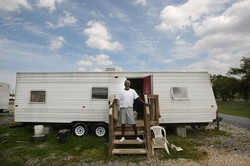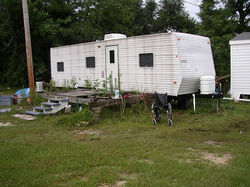FEMA trailer residents face final evictions
 Thousands of people who lost their homes during Hurricanes Katrina and Rita are about to lose their homes again.
Thousands of people who lost their homes during Hurricanes Katrina and Rita are about to lose their homes again. More than 5,000 people in Louisiana, Mississippi and Alabama were living in temporary Federal Emergency Management Agency trailers and in hotels financed by the agency as of May 1. Now FEMA says its housing program has officially come to an end, and the agency plans on evicting all residents by the end of the month. But many residents say they have nowhere to go.
The New York Times calls the FEMA deadline, which ends temporary housing before permanent housing has replaced it, "a stark example of recovery programs that seem almost to be working against one another." Housing advocates have urged FEMA to extend its deadline because the remaining trailer residents are among the Gulf Coast's most vulnerable, having very few or no options once they are evicted. Most of the residents are severely impoverished, mothers with young children, elderly, or disabled, including amputees, diabetes patients, and the mentally ill. More than 2,000 are homeowners who have been trying to rebuild but need more time, having had to to contend with numerous rebuilding barriers including government agencies fraught with red tape and delays.
And these residents have little help coming their way.
According to the Times:
Thousands of rental units have yet to be restored, and not a single one of 500 planned "Katrina cottages" has been completed and occupied. The Road Home program for single-family homeowners, which has cost federal taxpayers $7.9 billion, has a new contractor who is struggling to review a host of appeals, and workers who assist the homeless are finding more elderly people squatting in abandoned buildings.Gulf Coast advocates are not surprised that FEMA has yet again failed to be responsive to the needs of those struggling to rebuild their lives in the region. From the beginning, Gulf advocates have pointed out that FEMA's response to the housing and relief needs of Katrina survivors has been inadequate, ineffectual and full of delays and bureaucratic red tape.The 143,000 FEMA trailers provided to residents after the hurricane was the largest undertaking in the agency's history, but the delivery of the trailers was sluggish and inefficient. Moreover, many of the trailers were later found to contain dangerous levels of formaldehyde, a health crisis that FEMA was also slow to respond to.
Nonetheless, FEMA wants its trailers back, even though it plans to scrap or sell them for a fraction of what it paid for them.
FEMA says it will request the Department of Justice's assistance to"pursue legal action" for people still in their trailers after May 30. The agency also contends it has done everything it can to help those in temporary housing, yet many families say they've received little to no help from FEMA.
In Louisiana, state programs have also done little to help, residents argue. On top of the failed "Katrina cottages" program, the Louisiana Road Home program, which is intended to provide large grants to homeowners for repair, has been beleaguered with red tape, bureaucratic delays and administrative problems, which resulted in a sluggish pace in delivering grants. Grants have also been inadequate for meeting rebuilding needs. Last year the the nonprofit advocacy group PolicyLink found that two out of three Louisianans who received rebuilding money did not receive enough to cover needed repairs. Renters didn't fare any better: A government program intended to repair more than 18,000 damaged rental units resulted in fewer than 1,200 repairs by late March, according to the LA Times. Last year, the Louisiana Recovery Authority was supposed to unveil a more intensive caseworker system for people in temporary housing, but it never materialized, leaving local aid organizations to combat the homelessness and poverty still associated with the storm.
 In New Orleans, nearly 2,000 trailers remain in the metro area. During the past three years, Facing South has reported on the severe affordable housing crisis facing many New Orleans residents. Rental rates in the city have skyrocketed and for many low-income residents the available apartments are simply not affordable. The homeless population has doubled since the hurricane, and case workers continue to find more and more people living in abandoned buildings.
In New Orleans, nearly 2,000 trailers remain in the metro area. During the past three years, Facing South has reported on the severe affordable housing crisis facing many New Orleans residents. Rental rates in the city have skyrocketed and for many low-income residents the available apartments are simply not affordable. The homeless population has doubled since the hurricane, and case workers continue to find more and more people living in abandoned buildings. The U.S. Human Rights Network has called on the Obama administration to address the eviction issue and to meet the needs of the still-struggling residents. In fact, in a recent statement USHRN underscores that meeting the needs of Katrina survivors is "an issue of basic human rights":
It is a sad commentary on our priorities when our government can find billions of dollars to bail out banks but cannot come up with the funds to house families and individuals that were displaced by Hurricane Katrina. To take the most vulnerable victims of Katrina and leave them to fend for themselves is not only unconscionable, it is a violation of the government's obligation under international law to protect people from arbitrary displacement from their homes.Gulf advocates charge thatat a time when the United States is mired in a deepening recession anda foreclosure crisis, help for the Gulf Coast's most vulnerable isneeded now more than ever.
Thousands of persons -- not unsurprisingly principally people of color -- are still displaced from their Gulf Coast region home and the federal government has the primary responsibility to provide assistance to these displaced persons throughout the duration of their displacement. The government also has the responsibility to create the conditions that allow displaced persons to either resettle or return to their communities; the government has failed to do both. We call on the Obama Administration to reverse this decision and to commit itself to providing substantive direct support to the victims of this disaster.
